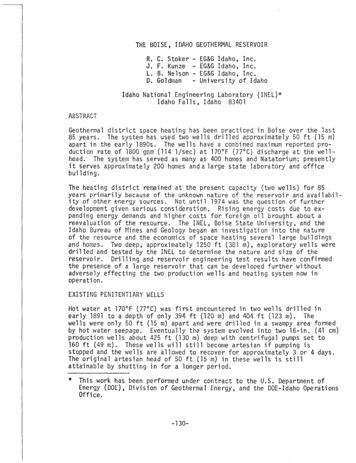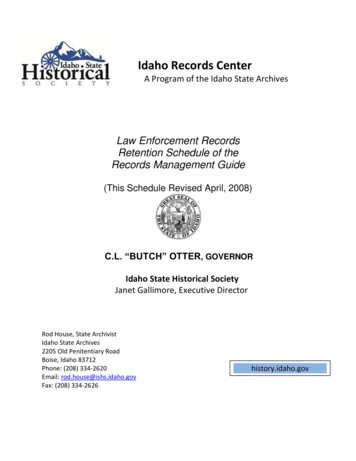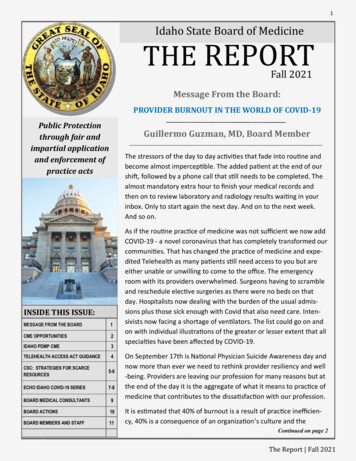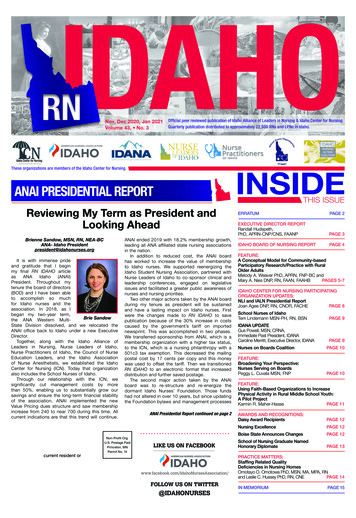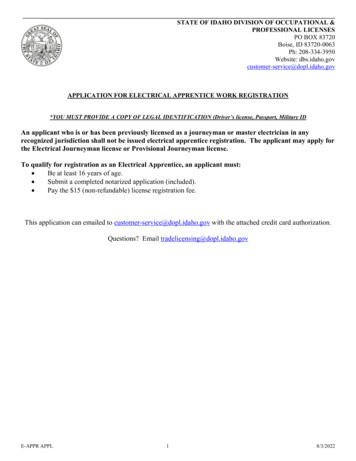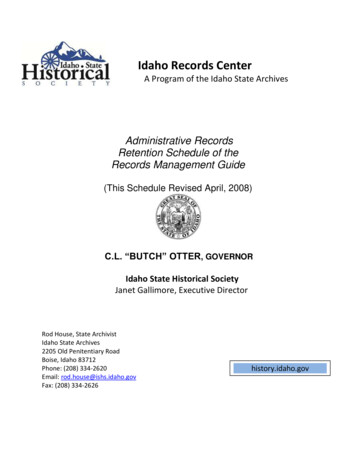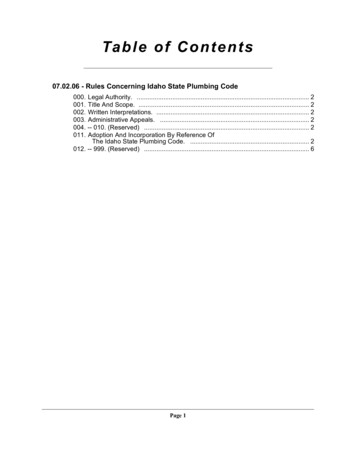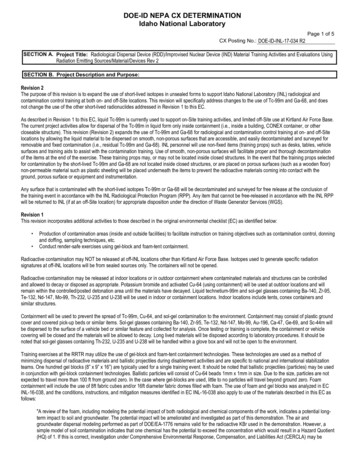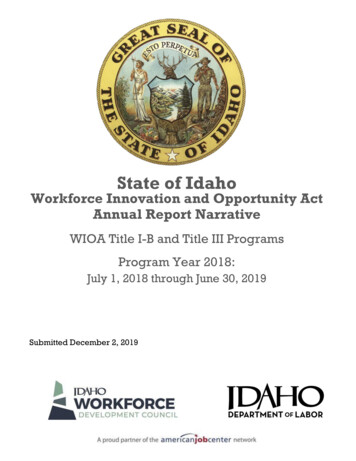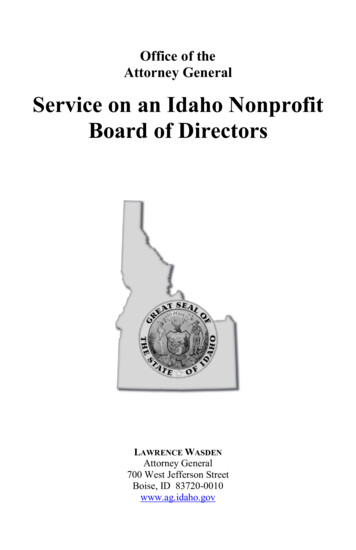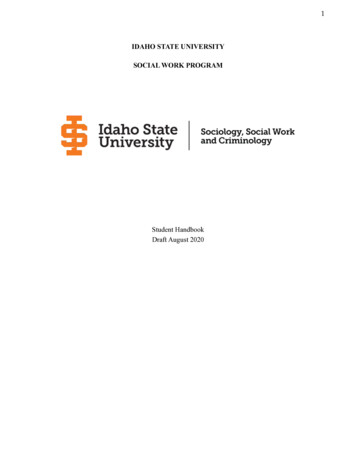
Transcription
1IDAHO STATE UNIVERSITYSOCIAL WORK PROGRAMStudent HandbookDraft August 2020
2TABLE OF CONTENTSSocial Work: A Professional Career .3Is Social Work the Right Career for You? .5The Idaho State University Master of Social Work Program .7The Master of Social Work Program Goals.8The Master of Social Work Curriculum Plans .11The Master of Social Work Course Descriptions .16Admission to the Master of Social Work Program .24Student Engagement and Participation.30Practicum Placements and Process.34Practicum Policies .37Academic Performance Review and Procedures.41Faculty Review Committee .42Termination from the Master of Social Work Program .44Program Faculty .45Useful Links .45NASW Code of EthicsIdaho Code of Professional ConductCouncil on Social Work EducationMaster of Social Work Curriculum PlansAdmission Requirements to the Master of Social Work ProgramOnline Graduate School Application for Admission to Master of Social WorkProgramStudent ServicesAppendix .47Professional Expectations for Social Work Students Rating Form
3Welcome to the Master of Social Work Program at Idaho State University! Acareer in social work is filled with meaning, action, diversity and satisfaction. As SocialWork Program Faculty, we are honored to be a part of your educational and careerjourney.This handbook is designed to familiarize you with the field of Social Work, theISU Master of Social Work (MSW) Program, and student resources. A copy of theStudent Handbook is available on our program homepage l .We encourage student involvement and welcome your questions, comments, andconcerns.Best Wishes!ISU Master of Social Work Program FacultyMSW Program Director: Fredi Giesler, MSW, Ph.D.Telephone:(208) 282-3377 (208) 282-1236Fax:(208) 282-4733Social Work: A Professional CareerThe purpose of the social work profession is to promote human andcommunity well-being. Guided by a person and environment construct,a global perspective, respect for human diversity, and knowledge basedon scientific inquiry, the purpose of social work is actualized through itsquest for social and economic justice, the prevention of conditions thatlimit human rights, the elimination of poverty, and the enhancement ofthe quality of life for all persons, locally and globally.(CSWE Educational Policy and Accreditation Standards, 2015, p. 5)Professional social workers assist individuals, groups, and communities in restoringor enhancing their capacity for social functioning, while creating societal conditionsfavorable to their goals. The practice of social work requires knowledge of humandevelopment and behavior, of social, economic and cultural institutions, and of theinteraction of all these factors. Social work is a profession devoted to helping people function
4the best they can in their environments. This not only means providing services or therapydirectly to people, but also working for change to improve social conditions.The phrase "in their environments" points to a distinguishing characteristic of socialwork—one that sets it apart from other helping professions. Social workers help clients dealwith how they feel about a situation and with what they can do about it. As a social worker,you will help people overcome some of the most difficult challenges in life includingdiscrimination, poverty, mental illness, abuse, addiction, physical illness, loss, disability andeducational problems. Social workers help prevent crises as well as counsel individuals,groups, families, organizations and communities to cope more effectively with the stresses ofeveryday life (NASW, http://www.socialworkers.org/, 2009).Professional social workers can be found in almost every facet of community lifeincluding public and private agencies serving those who are poor, schools, hospitals, prisons,senior centers, residential living facilities, mental health clinics, military organizations, andcorporations. The social work profession has its own body of knowledge, code of ethics,practice standards, credentials, state licensing, and a nationwide system of accreditededucation programs. These equip the professional social worker to combine the desire to helpothers with the knowledge, skills, values, and ethics necessary to provide that help.To be a social worker one must have a degree in social work from a college oruniversity program accredited by the Council on Social Work Education. At ISU theundergraduate degree is the Bachelor of Arts in Social Work (BASW) and prepares graduatesfor generalist entry-level practice. At ISU students may also earn a graduate degree, theMaster of Social Work (MSW), which enables graduates to engage in advanced clinicalpractice. Graduates with an MSW may also earn the Doctorate in Social Work (DSW) or aPhD, which are useful for conducting research or teaching at the university level. ISU doesnot offer a DSW or a Ph.D. in Social Work. Degree programs involve classroom study aswell as practical field experience.Most states, including Idaho, require practicing social workers to be licensed,certified, or registered, although standards vary across states. Specific information aboutstate social work licensing requirements can be found on the Association of Social WorkBoards (ASWB) webpage -regula8on/social-work-regula8on/). Contact the state regulatory board directly ?Bureau SWO) or the Association of State
5Social Work Boards (www.aswb.org) for a list of regulatory agencies or for a comparison ofstate regulations.The National Association of Social Workers (NASW) is the largest membershiporganization for social workers in the world. To discover additional information about theprofession of social work, we encourage you to browse the NASW website at: http://www.socialworkers.org.Is Social Work the Right Career Choice for You?If you are looking for a career with meaning, action, diversity, satisfaction, andflexibility, then consider social work. Social workers are people who care about people, whowant to make things better, who want to relieve suffering, and who want their work to makea difference (NASW, http://www.socialworkers.org/, 2009).Characteristics of effective social workers include: A general belief in people’s potential for positive change and a sense ofcommitment to the well-being of other peopleA commitment to helping individuals, groups, and community systemsfunction effectively and to helping meet their needs to the greatest extentpossibleStrong analytic and communication skills, both verbal and writtenA non-judgmental and non-punitive attitude toward people with problemsAn interest in people and the ability to form effective working relationshipswith different kinds of people from many different backgroundsA willingness to abide by the National Association of Social Workers(NASW) Code of EthicsAn understanding of the need to acquire the knowledge and skills necessary towork effectively in a helping relationship with others and to fight realisticallyand effectively against social problemsSufficient objectivity, emotional stability and a healthy self-concept to be ableto focus on the needs of clients with whom you work rather than trying to useyour clients to meet your own needs
6For more information about social work as a career, we encourage you to visitNASW’s website: http://www.socialworkers.org/Careers.aspx.
7The Idaho State University Master of Social Work ProgramMission StatementThe mission of the Master of Social Work Program at Idaho State University (ISU) isto prepare students for advanced clinical social work practice that promotes human andsocial well-being and advances social justice. Graduates are expected to become culturallycompetent and effective practitioners with professional values, evidence-based knowledge,and skills relevant to their local and global communities.The Master of Social Work ProgramThe Master of Social Work (MSW) Program is located within the Department ofSociology, Social Work and Criminology in the College of Arts and Letters. The MSWdegree program that is expected to be accredited by the Council on Social Work Education,the national accrediting agency, in June, 2021.The mission of promoting human and social well-being and advancing social justicethrough advanced clinical practice emphasizes the importance of generalist practice skillsapplied at different system levels and also focuses on clinical social work practice that willtranslate into improving macro practice environments. The generalist practice contentincorporates the client’s relationship to the environment and requires students gain skills inassessment, problem solving and resource development, in order to work with people of allages and backgrounds at different levels of practice. Founded on the generalist practicecurriculum, the specialized practice content focuses on developing advanced clinical practiceskills with an emphasis on practice with children and families and forensic social work. Theprogram’s objective is to equip students with the knowledge, professional values, skills, andscientific and practice methods that are required for generalist social work practice as well asadvanced knowledge and clinical practice skills for advanced professional social workpractice.Central to the program is a commitment to human and social well-being and socialjustice. The program strives to support students in their development as practitioners whoidentify themselves with the social work profession and are able to apply ethical principlesand critical thinking in practice. Students are prepared to deliver social work services thatimprove and enhance well-being for individuals, families, groups, organizations, and localand global communities by applying evidence-based knowledge. This includes the
8elimination of social injustices, which deny human dignity and opportunity. Students areencouraged to incorporate social diversity in their practice and to advocate for human rightsand social, economic, and environment justice by recognizing, supporting, and building onthe strengths and resiliency of human beings locally and beyond. Students are expected todevelop critical thinking skills and apply scientific inquiry and research-informed practice.Students gain expertise in the content areas of practice with children and families or forensicsocial work through electives courses and advanced Field Practicum placements designed tostrengthen their clinical practice skills. The MSW Program is committed to fostering valuesthat respect cultural diversity and life experiences, and to help diverse students integratethose values and experiences into their professional education and practices.Idaho State University Master of Social Work Program GoalsDerived from the Program mission, the goals of the Master of Social Work Program are toprepare students:1. To develop an identity which will incorporate the values, principles, and ethics of thesocial work profession2. To develop practice skills with individuals, families, groups, organizations, andcommunities applying evidence-based knowledge3. To develop critical thinking skills based on scientific inquiry and research-informedpractice4. To work with diverse, vulnerable, oppressed and disadvantaged populations locallyand globally5. To advance global human rights and social, economic, and environmental justice6. To gain expertise in clinically focused practice with an emphasis on children andfamilies and forensic social workUpon completion of the program, students are expected to have achieved nine corecompetencies as outlined in the CSWE 2015 Education Policy and Accreditation Standards:1.2.3.4.5.6.Demonstrate Ethical and Professional Behavior.Engage Diversity and Difference in Practice.Advance Human Rights and Social, Economic, and Environmental Justice.Engage In Practice-informed Research and Research-informed Practice.Engage in Policy Practice.Engage with Individuals, Families, Groups, Organizations, and Communities.
97. Assess Individuals, Families, Groups, Organizations, and Communities.8. Intervene with Individuals, Families, Groups, Organizations, and Communities.9. Evaluate Practice with Individuals, Families, Groups, Organizations, andCommunities.For detailed information on each of these competencies, please refer to: olicies/2015-EPAS.Upon graduation from the MSW Program, the student is eligible to apply forlicensure as a social worker in the State of Idaho or any other state in the United States.Many excellent career opportunities for social workers are available in the areas of familyand children’s services, adult and juvenile corrections, health care, community mental health,and services for senior citizens.Master of Social Work Program ContextSocial work job openings are growing at local, state, and national levels and are expected tosignificantly exceed other career opportunities. Particularly in Idaho, social work-related jobsare likely to be one of the top areas of growth throughout the 2020’s according to the IdahoShort-Term Occupational and Industry Project Report (2014).The MSW program was approved by the Idaho State Board of Education on December 19,2016. The Northwest Commission on Colleges and Universities approved the addition of theMSW as part of the accreditation of Idaho State University on May 4, 2017. In order toacquire a social work license students must graduate from an accredited social workeducation program (Idaho Administrative Code IDAPA 24.14.01 - Rules of the State BoardBureau of Occupational Licenses of Social Work Examiners, Section 100, Page 3). The ISUMSW program’s candidacy was approved October, 2019 and the program is on track to beaccredited by CSWE in June 2021.The MSW Program has six full-time faculty with a primary assignment to teaching andservice in support of the MSW. MSW faculty have practice and research expertise in theareas of practice with children and families, forensic social work, gerontology, mental health,and macro practice.
10The Master of Social Work Program OverviewProgram options. The ISU MSW program is a clinically focused advanced socialwork master’s program. The program offers the MSW degree with an emphasis on childrenand families and forensic social work practice.Advanced standing. Students admitted with advanced standing have completed aBSW in a CSWE accredited Social Work program within the past 7 years, which includes afield internship of not less than 400 hours under the supervision of a professional with aBSW/MSW from a CSWE accredited Social Work Program. All students complete 500 hoursof advanced Field Practicum and weekly seminars, and two bridge courses (6 credits), inaddition to the curriculum of specialized practice education (12 required credits and 9elective credits).!!Advanced HBSE II and Diversity Issues (SOWK 5510)Applied Research in Social Work (SOWK 6615)Generalist practice. The generalist practice content incorporates the knowledge,values, and skills required to work as a generalist practitioner with individuals, families,groups, organizations, and communities. Students will complete 400 hours of field educationand 30 hours of credits including 6 credits of field practicum and seminar over twosemesters.Specialized practice. The specialized practice content builds on the generalistperspective by offering courses and practicums for advanced clinical practice skills andknowledge with an emphasis on children and families and forensic social work. Students willcomplete 500 hours of advanced field education and 29 hours of credits. Among thosecredits, 8 credits are assigned on field practicums and seminars and 9 credits are assigned totake specialty required elective courses for developing clinical practice skills and expandingknowledge either in children and families or forensic social work.
11The Master of Social Work Curriculum PlansTable 1. Standard Admission: Two – Year, Full-Time Study Curriculum (without BSWdegree)Year 1: Generalist Practice Courses (30 Credits, 400 Hours of Field Practicums)Fall SemesterSOWK#Course TitleSpring SemesterCr.SOWK#Course TitleCr.5501Foundations of SocialWork35520Direct Practice withIndividuals and Families35510Human Behavior Theoryand Diversity (DL)35550Direct Practice with Groups35571Social Welfare Policy(Online)35594Community Organization and3Social Change (Online)5515Research in Social Work36615Applied Research in SocialWork35576Field Practicum I25578Field Practicum II25577Field Seminar I15579Field Seminar II1Total Credits15Total Credits15Specialty Area RequiredElective3SOC/SOWK5591/6691Summer SemesterYear Two: Specialized Practice (30 Credits, 500 Hours of Advanced Field Practicums)Fall SemesterSOWK#Course Title6620Advanced PracticeInterventions andComparative Theories6630ProfessionalCommunication (DL)Spring SemesterCr.33SOWK#Course TitleCr.6625Evaluation of MentalDisorders36671Advanced Policy,Legislations, andAdministration (online)3
12SOC/SOWK Specialty Area5591/6691 Required Elective3SOC/SOWK5591/6691Specialty Area Required3Elective6676Field Practicum III36678Field Practicum IV36677Field Seminar III16679Field Seminar IV1Total Credits13Total Credits13Students admitted with standard admission may also complete the MSW on a part-time basisover four years. The following table details the recommended course of study.Table 2. Course Progression for Four-Year Part-Time StudyGeneralist Practice Curriculum (30 Credits, 400 Hours of Field Practicums)Year One Fall SemesterSOWK#Course TitleSpring SemesterCr.SOWK#Course TitleCr.5501Foundations of SocialWork35520Direct Practice withIndividuals and Families35510Human Behavior Theoryand Diversity (DL)35550Direct Practice with Groups35594Community Organization andSocial Change (Online)3Total Credits9Total Credits6Year Two Fall SemesterSpring Semester6615Applied Research in SocialWork325578Field Practicum II2Field Seminar I15579Field Seminar II1Total Credits9Total Credits65515Research in Social Work35571Social Welfare Policy(Online)35576Field Practicum I5577
135591/6691Summer semesterSpecialty Area RequiredElective3Specialized Practice Curriculum (30 Credits, 500 Hours of Advanced Field Practicums)Year Three Fall SemesterSOWK#Course TitleSpring SemesterCr.6620Advanced Practice3Interventions andComparative Theories6630ProfessionalCommunication (DL)3Total Credits6Year FourSOWK#Cr.6625Evaluation of MentalDisorders36671Advanced Policy,Legislations, andAdministration (online)3Total Credits9Fall SemesterSOC/Specialty AreaSOWKRequired Elective5591/6691Course TitleSpring Semester3SOC/SOWK Specialty Area Required5591/6691 Elective36676Field Practicum III36678Field Practicum IV36677Field Seminar III16679Field Seminar IV1Total Credits7Total Credits7
14Table 3. Advanced Standing Admission: 1-Year, Full-Time Study Curriculum Plan(with BSW Degree)Advanced Standing (35 credits, 500 hours of Advanced Practicum)Fall SemesterSOWK#Course Title5510Human BehaviorTheory and Diversity(DL)6620Advanced PracticeInterventions andComparative Theories6630ProfessionalCommunication (DL)Spring SemesterCr.SOWK#Course TitleCr.6625Evaluation of MentalDisorders336671Advanced Policy,Legislations, andAdministration (online)336615Applied Research inSocial Work3Specialty Area RequiredElective33SOC/SOWK5591/6691Specialty AreaRequired Elective3SOC/SOWK5591/66916676Field Practicum III36678Field Practicum IV36677Field Seminar III16679Field Seminar IV1Total Credits16Total Credits16Summer 6-8 WeeksSOWK#SOC/SOWK5591/6691Course TitleCr.Specialty AreaRequired Elective(online)3Total Credits3Students admitted with advanced standing may also complete the MSW on a part-time basisover two years. The following table details the recommended course of study. Students areencouraged to work with their advisor to customize their course of study when appropriate.
15Table 4. Course Progression for Two-Year Part-Time StudyAdvanced Standing Admission (35 Credits, 500 Hours of Advanced Field Practicums)Year OneFall SemesterSpring SemesterSOWK#Course TitleCr.5510Human BehaviorTheory and Diversity(DL)6620Advanced Practice3Interventions andComparative Theories6630ProfessionalCommunication3Total Credits93SOWK#Course TitleCr.6625Evaluation of MentalDisorders36671Advanced Policy,Legislations, andAdministration3Specialty Area RequiredElective3Total Credits9SOC/SOWK5591/6691Summer 6-8 WeeksSOC/Specialty AreaSOWKRequired Elective5591/6691Total CreditsYear Two33Fall SemesterSOC/Specialty AreaSOWKRequired Elective5591/6691Spring Semester3SOC/SOWK5591/6691Specialty Area RequiredElective36676Field Practicum III36678Field Practicum IV36677Field Seminar III16679Field Seminar IV1Total Credits7Total Credits7
16The Master of Social Work Course DescriptionsGeneralist Practice:Foundations of Social Work (SOWK 5501) will cover foundational concepts of the socialwork profession, including introduction of frameworks and models to understand humanbehavior and the social environment. Students are introduced to ethics, values, and standardsof the profession, along with foundational conceptual frameworks and issues in humanbehavior and development. Special attention is devoted to the concept of person inenvironment, biopsychosocial perspective, human development over the lifespan, and socialdiversity. Generalist practice with a systems approach will be emphasized, and examples willbe included that focus on racial, ethnic, gender, and sexual diversity and various vulnerablepopulations.Human Behavior Theory and Diversity (SOWK 5510) will focus on families, groups,organizations, and communities. Students will apply conceptual frameworks and issues forunderstanding human behavior in the social environment at the mezzo or macro levelsystems as a function of bio-psycho-social-spiritual processes and interactions. Students willlearn the structure and function of larger systems and their impact on people. Systems’perspective and empowerment approach will be applied. Diversity issues pertaining to racialand ethnic groups as well as cultural differences will be discussed at the individuals’ andcommunity’s levels of social work practice.Direct Practice with Individuals and Families (SOWK 5520) will examine micro levelsystems within the generalist practice framework. Theoretical frameworks for use withindividuals and families as well as interviewing and problem-resolution methods will becovered. Students will learn the NASW Code of Ethics and how these ethics and values ofsocial work affect micro level practice. Students will utilize a generalist skill base in learningto engage, assess, intervene, and evaluate with individuals and families.Direct Practice with Groups (SOWK 5550) will examine mezzo level systems within thegeneralist practice framework. Group theory, process, dynamics and their applications topractice will be covered. Students will utilize a generalist skill base in learning to engage,assess, intervene, and evaluate with small group systems. Knowledge, values, skill, cognitiveand affective processes and behaviors development within the framework of generalistpractice is presented in this course while focusing on specific intervention strategies withinthe content area of group work at the master’s level.
17Social Welfare Policy (SOWK 5571) will examine social issues and problems within thecontext of policy systems. Social policies are created to address social issues and problems,including those pertaining to health, mental health, child welfare, discrimination, economicinequality and poverty, food and environment, housing, and crime. This course will reviewhistorical and contemporary social welfare issues and policies and focus on political andeconomic conditions that shape policy needs and development. The American welfare statewill be discussed by comparing various welfare systems in different countries. Criticalanalysis and evaluation of policy will be also emphasized. Students will apply criticalthinking and research skills to understand policy development and evaluation. Students willalso learn policy practice skills that are utilized to advocating for social, economic, andenvironmental justice for client populations.Community Organization and Social Change (SOWK 5594) will prepare students withsocial work practice skills to aid clients with a focus on community and organizationalstructure and function. This course will utilize the framework of generalist practice with adirect focus on organizations and communities. Students will develop effective interpersonaland critical thinking skills that are conducive to working with organizations andcommunities. Students will expand understanding of social, economic, and environmentaljustice to advocating for human rights at individuals’ and multiple systems’ levels. Studentswill be expected to apply research skills to gather, organize, and interpret data that can beused to assess organizational and community needs and develop an appropriate interventionplan. Specific attention will be given to helping students develop necessary skills to engage,assess, intervene and evaluate macro-level social changes in organizations and communities.Research in Social Work (SOWK 5515) will introduce the principles and procedures ofscientific research. This course will provide students with an introduction to the design andpractice of social research methods, including the conceptualization and measurement ofsocial phenomena, design of research projects, and techniques of data collection andanalysis. Students will learn how to formulate research questions and collect and analyzedata aimed at answering their questions. Students will learn basic statistical techniquesfocusing on descriptive statistics, hypothesis testing and correlations.Applied Research in Social Work (SOWK 6515) will prepare students with applying themethods of social research to the evaluation of social work practice and programs. Studentswill be expected to develop program evaluation and intervention skills using bothquantitative and qualitative methods. Students will be required to conduct a research project
18to demonstrate a competency in utilizing practice-informed research and research-informedpractice.Field Practicum & Seminar I (SOWK 5576, SOWK 5577) will facilitates studentapplication of classroom learning in a social service agency. Students will demonstrate theirpracticum competency in all nine competencies. In this internship students will gain ageneralist perspective of social work practice and prepare to move into an advanced area ofclinical practice. This course prepares students to apply practice theories, models, and ethicalprinciples in a specific social service delivery system. Students will complete their internshipat a minimum of 200 hours within a social service agency under direction of a licensedmaster’s level social worker. The Field Seminar offers students the opportunity to addressquestions and challenges experienced in the social work agency field placement and integratepractice, policy and research.Field Practicum & Seminar II (SOWK 5578, SOWK 5579) will be continuation of FieldPracticum and Seminar I (SOWK 5576, SOWK 5577) courses and facilitate studentapplication of classroom learning in a social service agency. Students will demonstrate theirpracticum competency in all nine competencies. In this internship students will gain ageneralist perspective of social work practice and prepare to move into an advanced area ofclinical practice. This course prepares students to apply practice theories, models, and ethicalprinciples in a specific social service delivery system. Students will complete their internshipat a minimum of 200 hours within a social service agency under direction of a licensedmaster’s level social worker. The Field Seminar offers students the opportunity to addressquestions and challenges experienced in the social work agency field placement and integratepractice, policy and research.Advanced Clinical Practice:Advanced Practice Interventions and Comparative Theories (SOWK 6620) builds onDirect Practice with Individuals and Families (SOWK 5520) and Direct Practice with Groups(SOWK 5530) by integrating advanced practice interventions and theories of social worktreatments. Students will learn how to apply current best practices with client populations ofinterests by utilizing evidence-based practice models and critical thinking. Students will alsoextend their clinical practice skills with individuals, families, and groups.Professional Communication (SOWK 6630) builds on Direct Practice with Individuals andFamilies (SOWK
The Idaho State University Master of Social Work Program Mission Statement The mission of the Master of Social Work Program at Idaho State University (ISU) is to prepare students for advanced clinical social work practice that promotes human and social well-being and advances social justice. Graduates are expected to become culturally
